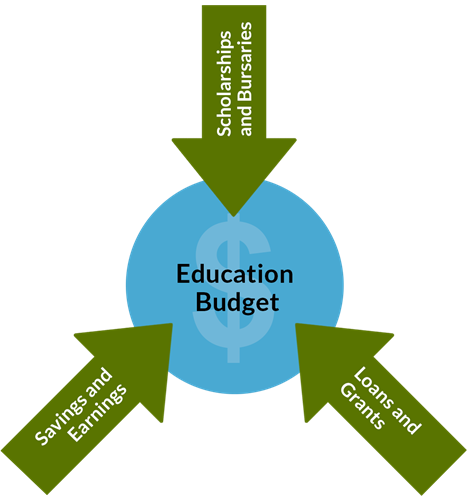How Much Will I Need?
Your budget for your post-secondary studies should reflect both your education and living costs:
- Education costs include your tuition and other fees charged by your institution (such as for books, laptops and student association memberships)
- Living costs include food, rent and daily transportation
Knowing what your expenses are will help you plan a budget that lasts through your studies. Not sure where to start? These resources can help.
Paying for Your Education
Most post-secondary students pay for their education using a combination of three different kinds of funding.

- Savings and Earnings are what you already have in the bank, what your family contributes and what you can earn
- Scholarships and Bursaries are money given to students based on academic performance or financial need
- Loans and Grants are dollars you receive to pay for your education - and that you pay back after you graduate
Where to Apply for Student Aid
Student Aid Alberta helps Alberta students pay for their post-secondary education. Find information about:
How Student Loans Work
Before you apply for student aid, calculate your tuition costs and how much money you need to pay your rent and for other costs of living. Student Aid Alberta uses monthly living allowances to find out how much funding support you may need. Using this information to create a budget for your education will help you figure out how much you may need to earn or borrow.
Government pays the interest on your student loans for you until you leave school. After that, interest starts accumulating on your account. It’s a good idea to start planning how to repay your loans before you finish your studies.
Working and Going to School
It’s possible to work and go to school. Before you take on a job though, find out how much time your post-secondary program needs from you every week. If you’re too tired or busy to study, your grades are going to suffer.
Some programs also combine learning with earning potential. For example:
- Apprenticeships give you on-the-job training to earn while you learn
- Some programs require a work practicum or co-op program, though these are not always paid and are only for part of the year
- Many graduate programs, such as master’s and doctoral degrees, give you an opportunity to earn money as a professor’s assistant, by conducting research or by teaching classes of your own
If you’re not able to leave your full-time job to pursue your post-secondary education, ask your institution if you can start your program on a part time basis or take some courses online.


